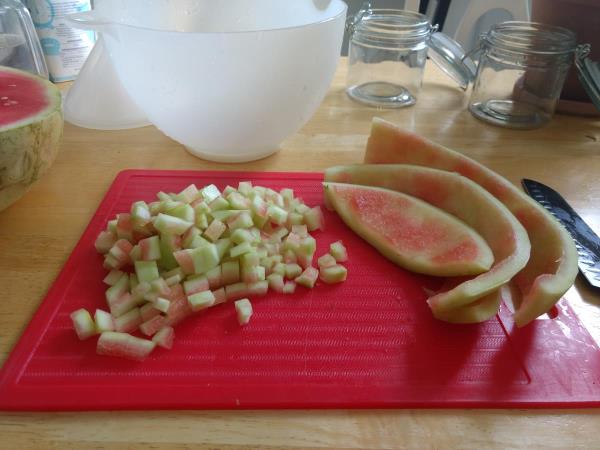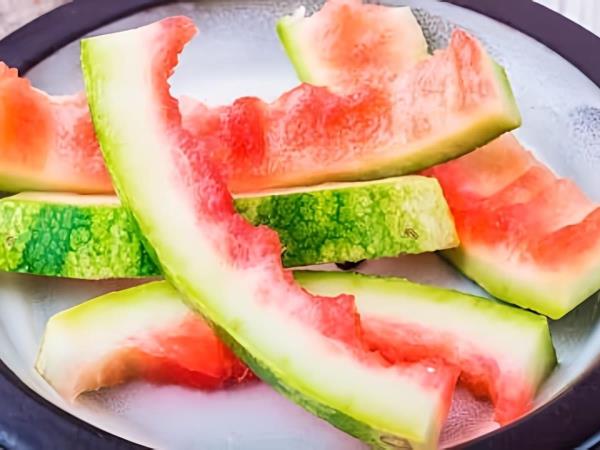Watermelon is among the fruits that refresh us in summer with just one bite. But what we usually throw away, the rind and the hard white interior, might be invaluable, especially for those struggling with excess weight, fatigue, slow digestion, or chronic inflammation in the body.
In recent years, many scientists have focused their attention on what we used to discard without a second thought. A study published in the renowned Journal of Nutrition proves that the excess parts of watermelon, the rind and the white portion just beneath the red flesh, can improve blood sugar levels, reduce inflammation, and even have a positive impact on our gut flora.
So, if you've been throwing away the watermelon rind until now, after reading this, you might think twice.
How exactly does it help?
Watermelon contains a natural substance called citrulline. This is an amino acid that helps our bodies produce nitric oxide. It may sound complex, but it's a natural gas that dilates blood vessels, ensuring that blood circulates smoothly and without obstruction throughout the body. Better circulation means lower blood pressure, improved organ function, and greater physical endurance. This is particularly beneficial for people dealing with high blood pressure or fatigue due to poor circulation.
Watermelon also contains lycopene, a natural pigment that gives it the distinctive red color. It is a potent antioxidant that combats free radicals in the body, harmful substances that cause cell aging and inflammation. According to Harvard Health, regular consumption of lycopene reduces the risk of heart disease by 17% and also protects the body from certain types of cancer, especially prostate cancer.
Mice that ate watermelon rind had lower blood sugar levels
In an interesting experiment, scientists in the laboratory fed several groups of mice. They all received fatty food similar to the everyday diet in the Western world: high in fats, low in fiber, low in vegetables. Only one group also received dietary supplements from watermelon rind and white interior.
After 10 weeks, researchers found that these mice had significantly lower blood sugar levels, despite consuming the same amount of calories as the others. The difference was clear: those without watermelon supplements had significantly elevated blood sugar levels, which in the human world leads to type 2 diabetes, whereas the watermelon mice had levels within the normal range.
Scientists estimate that a similar effect in humans can be achieved with just approximately 1.5 slices of watermelon a day or 2% of the diet consisting of fiber from watermelon rind. This means that simply with a daily smoothie or adding dried rind to cereals, you could do a lot for your health.
Improved insulin and gut health
One of the most interesting findings of the study is that the mice consuming watermelon supplements had lower insulin levels, the hormone that controls blood sugar. When we produce too much insulin, the body eventually stops responding to it, leading to what is known as insulin resistance, one of the main causes of developing diabetes.
Additionally, scientists in this group also observed remarkable changes in the intestinal microbiota. This is the collection of all bacteria in our intestines (both good and bad). In people with excess weight, the balance is usually disrupted, with harmful bacteria prevailing, affecting digestion, energy, and even mood.
In mice that ate watermelon supplements, the number of good bacteria noticeably increased. This means better metabolism, less gas and bloating, as well as a stronger immune system, as 70% of the immune system is located in the gut.
Inflammation - the silent enemy of health
In watermelon mice, scientists also observed a decrease in an inflammatory marker called prostaglandin F2a. Despite its lab-sounding name, this marker is just an indicator of the level of inflammation in the body. Inflammation is a natural defense reaction in the body, but when it lasts too long, due to poor diet, stress, or obesity, it starts to become harmful.
In this study, the drop in this inflammatory marker was the most surprising. Mice that ate fatty food without watermelon supplements had high levels of inflammation, whereas inflammation in watermelon mice was significantly lower.
This is the first study proving that consuming watermelon rind can alleviate inflammatory processes in the body, which is important for those suffering from chronic pain, autoimmune diseases, or joint issues.
Does watermelon help with weight loss?
Interestingly, all mice, both those with watermelon supplements and those without, had the same body weight at the end of the study. This means that watermelon alone does not cause weight loss, but it greatly improves metabolism, blood sugar, and reduces inflammation. With these effects, weight loss can be easier, as the body starts to function more harmoniously.
For example: a study from 2019, published in Nutrients, showed that regular consumption of watermelon improves satiety and reduces cravings for sweets. 82% of the participants reported having a reduced appetite after consuming watermelon compared to an equally caloric snack of cookies.
From waste to superfood?
One of the most interesting aspects of the study is its sustainability. Watermelon rind usually ends up in the trash. However, through a special drying process (lyophilization, which means freezing drying), scientists turned it into a green powder that can be mixed into bread, cakes, smoothies, or cereals. In 2020, they began developing a prototype product that could replace part of the flour in baked goods, thus providing a healthier meal.
If every person in Europe ate just one watermelon over the summer, thousands of tons of green waste could be saved. If these rinds were turned into functional flour, everyone would benefit: farmers, the environment, and us.
What can you prepare at home?
If you're tempted to try it yourself, you can make excellent tea from watermelon rind. Simply cut the watermelon rind into small pieces, dry it in the air or in the oven, and then grind it. Add the powder to smoothies, yogurts, cereals, or even bread dough.
Conclusion
While watermelon may not magically melt away excess pounds, it can greatly help the body start functioning better. With improved metabolism, lower blood sugar, fewer inflammations, and a healthier gut, your digestion will also improve. This forms the basis of well-being and long-term health. Instead of just eating the red part of the watermelon and discarding the rest, consider next time...
Datum: 18. JUL 25 - GOOD TO KNOW
Side products of watermelon effective against obesity
Did you know that watermelon rind helps with weight issues? But that's not all...

(FW)
 Would you like to be informed about news on the website?
Would you like to be informed about news on the website?
Just enter your e-mail
Watermelon rind benefits
Weight loss with watermelon
Watermelon health benefits
Watermelon supplements study
Watermelon rind powder
|
Copyright (c) Foodwhisper.com March 2018 |
π | Contact: info@foodwhisper.com |
About us | Facebook |  |









